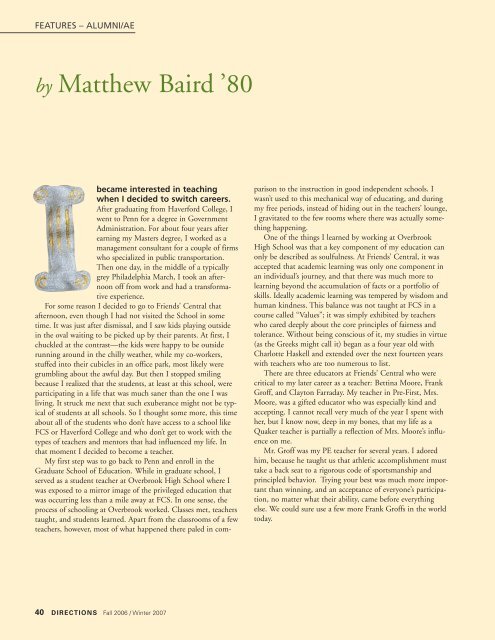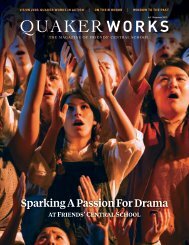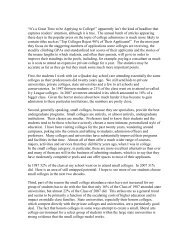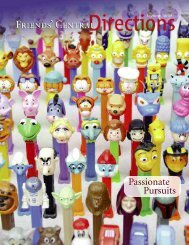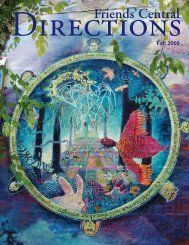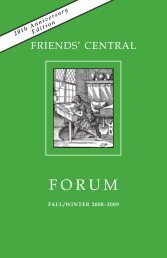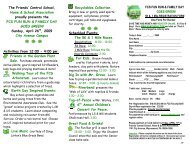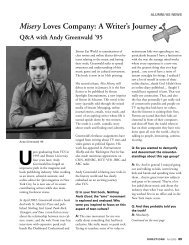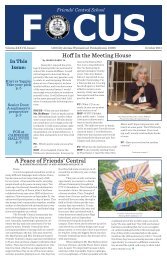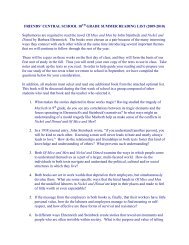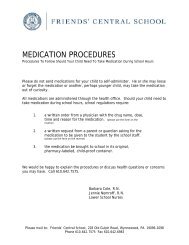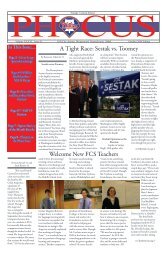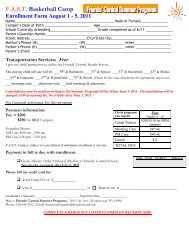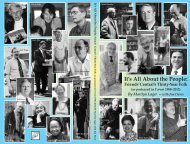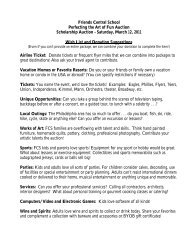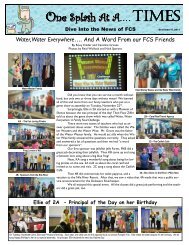2006-2007 Fall/Winter Directions - Friends' Central School
2006-2007 Fall/Winter Directions - Friends' Central School
2006-2007 Fall/Winter Directions - Friends' Central School
You also want an ePaper? Increase the reach of your titles
YUMPU automatically turns print PDFs into web optimized ePapers that Google loves.
FEATURES – ALUMNI/AE<br />
by Matthew Baird ’80<br />
became interested in teaching<br />
when I decided to switch careers.<br />
After graduating from Haverford College, I<br />
went to Penn for a degree in Government<br />
Administration. For about four years after<br />
earning my Masters degree, I worked as a<br />
management consultant for a couple of firms<br />
who specialized in public transportation.<br />
Then one day, in the middle of a typically<br />
grey Philadelphia March, I took an afternoon<br />
off from work and had a transformative<br />
experience.<br />
For some reason I decided to go to Friends’ <strong>Central</strong> that<br />
afternoon, even though I had not visited the <strong>School</strong> in some<br />
time. It was just after dismissal, and I saw kids playing outside<br />
in the oval waiting to be picked up by their parents. At first, I<br />
chuckled at the contrast—the kids were happy to be outside<br />
running around in the chilly weather, while my co-workers,<br />
stuffed into their cubicles in an office park, most likely were<br />
grumbling about the awful day. But then I stopped smiling<br />
because I realized that the students, at least at this school, were<br />
participating in a life that was much saner than the one I was<br />
living. It struck me next that such exuberance might not be typical<br />
of students at all schools. So I thought some more, this time<br />
about all of the students who don’t have access to a school like<br />
FCS or Haverford College and who don’t get to work with the<br />
types of teachers and mentors that had influenced my life. In<br />
that moment I decided to become a teacher.<br />
My first step was to go back to Penn and enroll in the<br />
Graduate <strong>School</strong> of Education. While in graduate school, I<br />
served as a student teacher at Overbrook High <strong>School</strong> where I<br />
was exposed to a mirror image of the privileged education that<br />
was occurring less than a mile away at FCS. In one sense, the<br />
process of schooling at Overbrook worked. Classes met, teachers<br />
taught, and students learned. Apart from the classrooms of a few<br />
teachers, however, most of what happened there paled in com-<br />
40 DIRECTIONS <strong>Fall</strong> <strong>2006</strong> / <strong>Winter</strong> <strong>2007</strong><br />
parison to the instruction in good independent schools. I<br />
wasn’t used to this mechanical way of educating, and during<br />
my free periods, instead of hiding out in the teachers’ lounge,<br />
I gravitated to the few rooms where there was actually something<br />
happening.<br />
One of the things I learned by working at Overbrook<br />
High <strong>School</strong> was that a key component of my education can<br />
only be described as soulfulness. At Friends’ <strong>Central</strong>, it was<br />
accepted that academic learning was only one component in<br />
an individual’s journey, and that there was much more to<br />
learning beyond the accumulation of facts or a portfolio of<br />
skills. Ideally academic learning was tempered by wisdom and<br />
human kindness. This balance was not taught at FCS in a<br />
course called “Values”; it was simply exhibited by teachers<br />
who cared deeply about the core principles of fairness and<br />
tolerance. Without being conscious of it, my studies in virtue<br />
(as the Greeks might call it) began as a four year old with<br />
Charlotte Haskell and extended over the next fourteen years<br />
with teachers who are too numerous to list.<br />
There are three educators at Friends’ <strong>Central</strong> who were<br />
critical to my later career as a teacher: Bettina Moore, Frank<br />
Groff, and Clayton Farraday. My teacher in Pre-First, Mrs.<br />
Moore, was a gifted educator who was especially kind and<br />
accepting. I cannot recall very much of the year I spent with<br />
her, but I know now, deep in my bones, that my life as a<br />
Quaker teacher is partially a reflection of Mrs. Moore’s influence<br />
on me.<br />
Mr. Groff was my PE teacher for several years. I adored<br />
him, because he taught us that athletic accomplishment must<br />
take a back seat to a rigorous code of sportsmanship and<br />
principled behavior. Trying your best was much more important<br />
than winning, and an acceptance of everyone’s participation,<br />
no matter what their ability, came before everything<br />
else. We could sure use a few more Frank Groffs in the world<br />
today.


